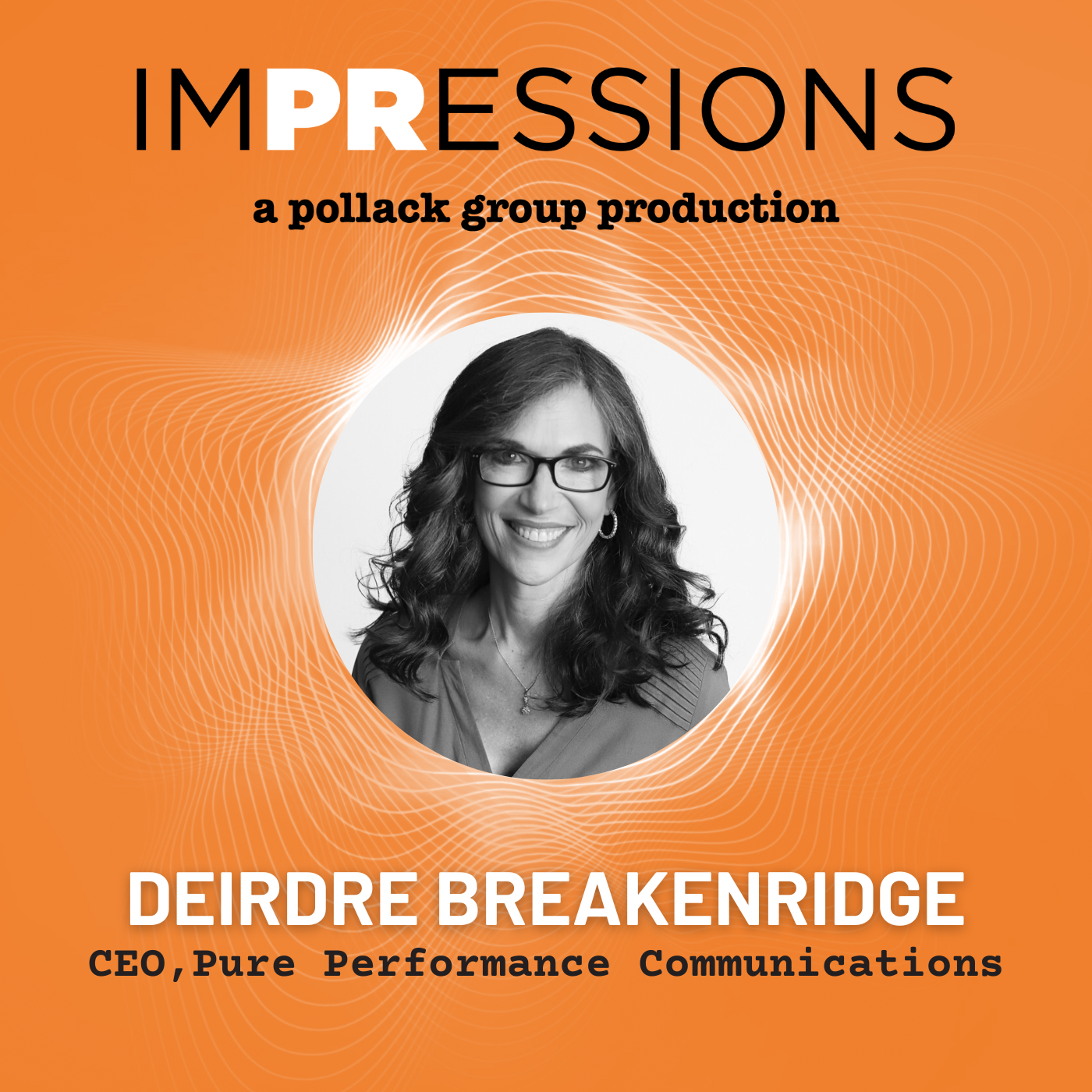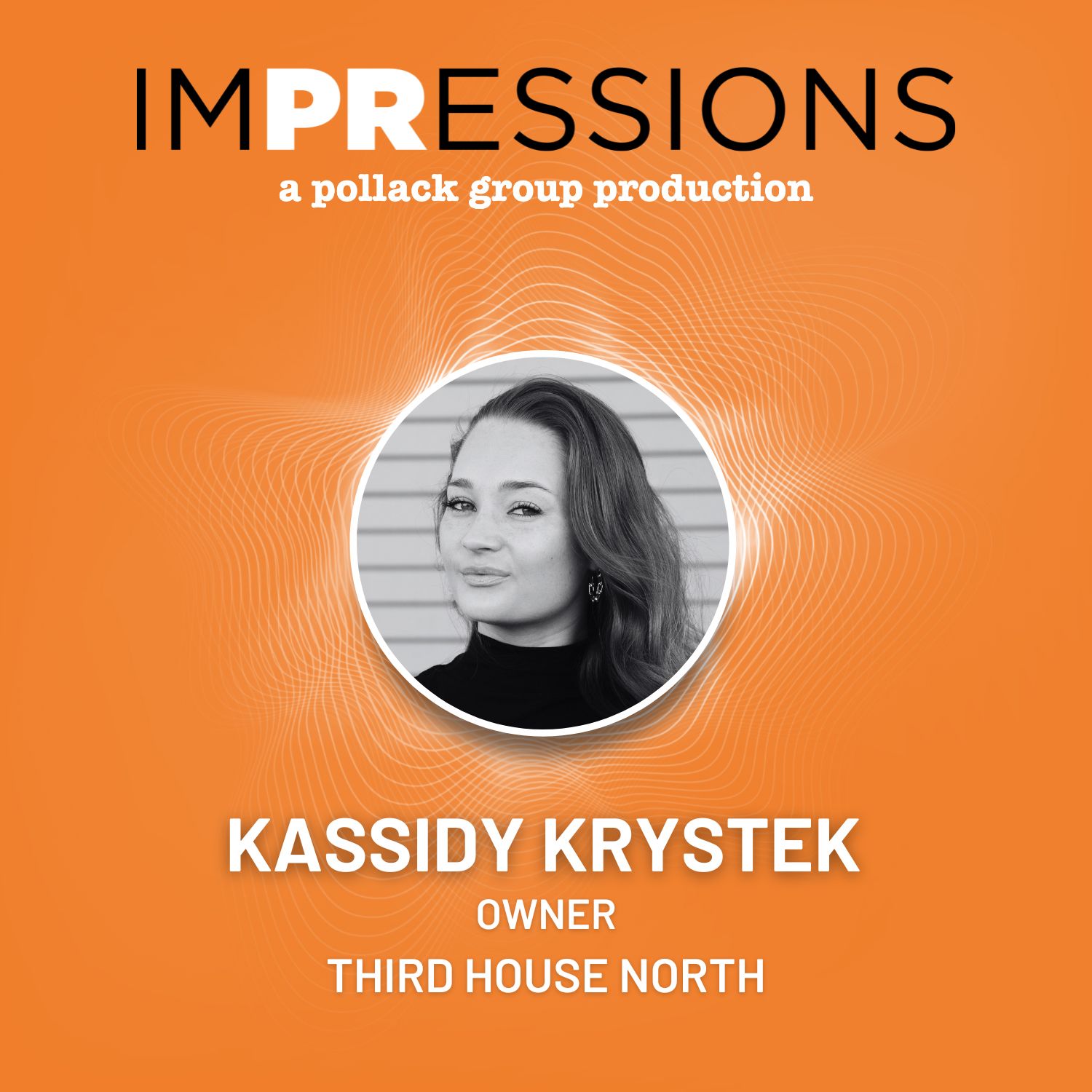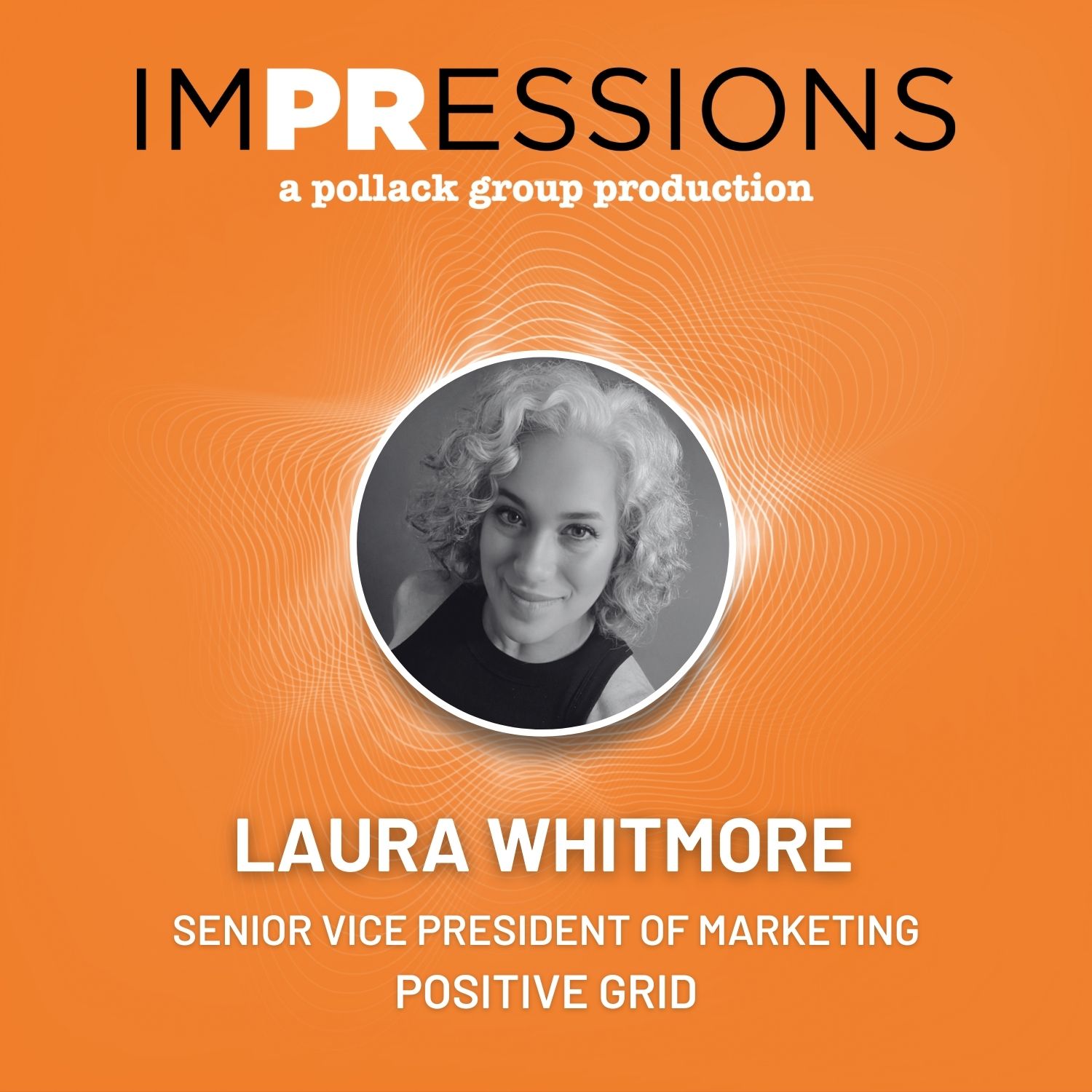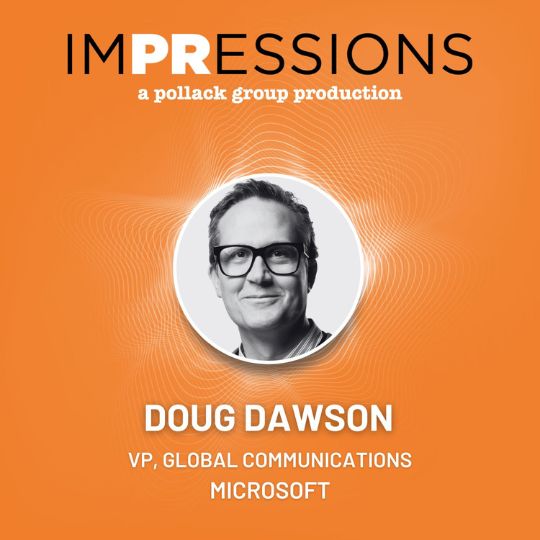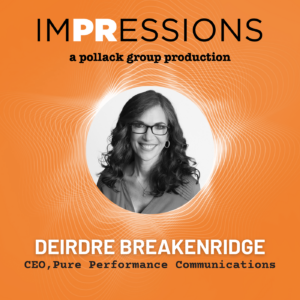 One of the first things we learn as children is the importance of listening, but do we actually learn HOW to listen? On imPRessions episode 6, Deirdre K. Breakenridge, CEO of Pure Performance Communications, dives deep into the skills we need to mindfully listen and how it’s key to hear what people are actually saying to enhance our communications skills.
One of the first things we learn as children is the importance of listening, but do we actually learn HOW to listen? On imPRessions episode 6, Deirdre K. Breakenridge, CEO of Pure Performance Communications, dives deep into the skills we need to mindfully listen and how it’s key to hear what people are actually saying to enhance our communications skills.
imPRessions Episode #6 Transcript
Kalli: What does it mean to mindfully listen? We pay attention in meetings, in class as we’re chatting with friends, but are we really listening and are there skills we can implement into our daily and professional lives that will enhance our ability to better communicate and to better perform? Deirdre Breckenridge, published author, performance coach, communications trainer and all around PR goddess, believes firmly in the power of meaningful listening. Today, we’ll speak with Deirdre as she helps us and our listeners channel our abilities to listen with intention effectively and mindfully.
Jenn: Hi Deirdre, It’s a pleasure to chat with you today.
Deirdre: Hi. Thank you. It’s great to be with you. Yes.
Kalli: Yes. Welcome to our show. So, Deidre, you’ve had a pretty extensive career in marketing and public relations. What drew you to the field initially?
Deirdre: Well, thank you for having me on your show, first off. And I guess you could say I had a guidance counselor back in high school who thought I had some potential and was very lucky that he recognized that I love to write. And he also knew that I was curious about the media and told me with that kind of interest, I could either go in one of two directions to be a journalist or to go into public relations, and I chose public relations and the rest is history.
Kalli: That’s great. You know, it’s it’s so important to have those early mentors and guidance counselors to help us find our way and obviously helped you find the correct path for you. I know.
Jenn: Wish I had that. Yes. Would have been helpful.
Deirdre: Yes, it’s so true because I was just one of those students who hooked on to something interesting and stuck with it. And today is very different because it takes young professionals a while to kind of get into their grooves.
Kalli: Definitely. And like I said, you know, having that guidance, you know, especially while you’re still in high school, is so important and hopefully can help many kids. And one of the things that people also kind of struggle with is public speaking, which is an integral part of leadership and often is a big part of public relations. But in your experience, you know, you’ve seen it is one of the most challenging components for many. Why do you think that is?
Deirdre: Well, when you think about the 77% of the population-I think that’s the most recent statistic, that has an anxiety around public speaking, you have to step back and say, oh, my goodness, there’s a lot of folks who really are apprehensive and don’t want to speak. So for me, which is now a part of what I do, I’m a trainer and a communications coach. I think a lot of it and it’s not just being on stage. It could be speaking in a meeting. I think a lot has to do with your belief in yourself. If you say that you can’t speak or I am afraid to speak, that’s how you show up and it’s changing your mindset, tuning in and changing your mindset and carving a new path really helps.
Jenn: I had a fantastic professor in college that we had to do a public speaking course and we had to do a couple of them and he taught all three courses. And it’s so true because it’s not even just public speaking in this situation where you think of being on a stage and leading a keynote, like you said, it’s even in meetings, it’s, you know, we working at an agency, we do new business meetings and we’re kind of trying to sell our agency and get new clients. Those particular situations also kind of are considered public speaking in a sense, too, and it’s that anxiety around it, which I definitely suffer with. But I remember I go back to that professor that I had and the way the things that he taught us still stick with me today. So it’s just such an amazing trait to have been really any field. But obviously especially in communications.
Deirdre: When it comes to the fear, just to jump in because, yeah, it’s important for people to recognize it’s usually based on some influence around you, whether you saw somebody who had trouble speaking and you internalized it, whether you were giving a presentation and you felt awkward or didn’t go right, it’s usually tied to some event. And that’s why it’s really important to recognize there’s a technique that I use because I’m a certified cognitive behavior therapy coach. So I got my certification in CBT because I wanted to help professionals, business leaders get over this fear. And it’s a way of just challenging your own thinking around a situation. And when you ask that first question about, you know, why do you think so many people are afraid, it’s because when something happens, you don’t necessarily challenge it. You frame thoughts around that situation, form a belief, have a negative emotion, and then your behavior plays out that way. So it’s really important to challenge your own thinking to carve a new pathway so that you can get past your limiting beliefs. And some of the things that we think when we have to stand up and speak.
Jenn: Definitely, definitely. And it’s so powerful to have that training and, you know, in public relations to media training, I mean, like just across the board. But I want to pivot for a second and ask about some of the new things. So last year in 2022, you published a children’s book called Daddy. Are you listening with the notion that meaningful listening starts in the early stages of our childhood? Can you tell us a little bit more about what meaningful listening really means and how we can all work towards becoming a better listener?
Deirdre: Yes. So when it comes to listening and I’m a firm believer that it starts early and you develop good practices so that you can then go out into your community or be with your friends or in the workplace to actually listen actively hear somebody and be able to help someone as a result or get better productivity in whatever you’re doing. But what I think happens is that we think we are listening and you have to be able to listen with your ears, listen with your eyes, listen with your senses. In other words, we’re not aware and we tend to not our heads as if we hear something, but we’re tuning out. And I do think a lot of the technology around us, social media, how many notifications we’re getting, the way we’re multitasking, all takes away from our ability to tune in and truly listen. Because as you’re listening to somebody speak, I have a program that incorporates not only the the words that they’re saying, but the sound of their voice, what their body is doing. Your body leaks stress. So when you’re listening and tying together vocal cues, verbal cues and nonverbal cues, that’s when you’re truly listening and you’ll be able to show somebody. And there are ways to show active listening and we can talk about that.
Kalli: That makes so much sense. And, you know, still just talking about the book, you know, Daddy, are you listening? Is your third children’s book part of the Whisper from Noelle series, You know, what inspired you to transition from PR and marketing to writing children’s books?
Deirdre: Well, I’m still very much entrenched in my world of helping professionals with communications and media training. However, there was a pivotal moment, a family tragedy that led to a passion project that led to these children’s books. It stemmed around the loss of my stepdaughter, Noelle, who was a 24-year-old millennial. When she passed away. I had a lot of questions about what millennials were thinking and feeling and what they valued. This passion project was an opportunity for me to speak with over 100 millennials, and I asked them the same questions over and over again to be able to better understand what they were looking for in their relationships, what trust meant, what they valued and expected from the people around them. And as I was going down this path of passion project, it formed a model which was a communication model that I called Feel, where millennials pretty much stated. Through all of their stories. They wanted the people around them to face fears. That’s the “F” in feel, to have empathy, that’s the first “e” to be ethical, that’s the second “e” in feel. And the last is the L, which is to unleash your love and feel is such a strong word with those components. But when it comes to feel and all the parts of that model, I thought, here I am, sharing it with professionals. Where does it belong? It belongs in the home. And then my husband said Noel loved children’s books and story time when she was little. Wouldn’t it be great to marry feel in children’s books? And that’s where the Whisper from Noel series came from. And Daddy, Are You Listening? Is the third book and we have book number four. It’s percolating now. So long story short, that’s how we got to the children’s books.
Jenn: That’s so sweet. I mean, just kind of gives me chills that you were able to take a terrible tragedy and really turn it into something meaningful for so many people all over the world that can kind of learn and become better listeners. And the thing with listening is it’s the first step, as you said, you know, kind of building trust. And you have that with a partner, a friend or of course, as a parent. But when we’re talking about meaningful listening in the workplace, how does that factor in?
Deirdre: Well, it’s a big factor. And the word trust is the foundation of any relationship. So if you’re looking to build relationships, let’s just take the manager and somebody who is on the team. If you want to build trust and for somebody really to share something with you so that you can listen and help them, you don’t have that unless trust is there in order to get to listening or you even in a place where somebody might share something that’s on a level beyond your productivity when it comes to teams and listening and work product, it’s for people to be able to be more situationally aware first to tune in to even just like all of our Zoom meetings when you go on a Zoom call and everybody’s on video, if you’re distracted, if you’re not self-aware, if you’re not tuned in, can you expect to listen? Are you going to hear everything that’s being stated? Will you be on the same page? Will you leave that meeting and do what you’re supposed to do if nobody’s taking the minutes? So there’s different levels of listening, listening for productivity and listening to build relationships with your co-workers. And I’ll just give you one example, because I remember one of the stories that came out of my passion project, a millennial, was at her workplace for three, almost four years, and she was working on a team project with the same team that she had been with, and they divvied up the project and she went off and she was doing her part. It was due in a week. They were all going to come back together and present to the manager, and it ended up that she started to get overwhelmed. She had a full-blown panic attack three days into the week of her part of the project, ended up in the hospital, had to stay in the hospital for 72 hours, got out of the hospital, scrambled to get her part of the project done new. She did a terrible job. It was subpar in her words, but submitted it anyway. Rather than saying I was in the hospital, I was having some issues because she thought nobody would listen. She didn’t think anybody would care. So that’s a whole different level of why you don’t even bother sharing correctly or what’s going on. So there’s a lot to attack when it comes to listening totally.
Jenn: And as a millennial, and I’m sure Kalli can attest to this too, I totally understand where she’s coming from and I totally understand what she means. And that’s the scary part, is that in a in a way, she’s right.
Deirdre: Completely right. Yeah. If you don’t think that people are going to have empathy or listen, then I’m fine. That’s usually what you hear. Let’s just say somebody recognizes that their teammate is not acting the same way that they normally do. And maybe this manager goes over and says, Hey, Susie, what’s going on? I noticed you’re not as talkative today. If Susie doesn’t feel comfortable, if there’s no trust, is Susie going to say, I’m having a really hard time, My grandmother is ill and I’m so sad. No, she’ll say, oh, I’m fine.
Kalli: You know, that’s so true. And, you know, as Jenn said, you know, as a millennial, that’s definitely something to relate to. And it’s funny because now in the role I’ve been now and even. In previous roles. A lot of times I’m working with younger people, trying to mentor and guide them, and I’ve noticed a lot of times that, like, you can tell something is up and you really do need to build that trust, but also really listen to what they’re saying. Because like you said, the first thing if somebody says to me, I’m fine. I know that you are not fine for the opposite of fine, because I know for myself, if you ask me how I am and I say I’m fine, I am not fine, I think the dictionary should probably redefine the word fine.
Deirdre: Exactly. That is one of the tells of possibly the person is not fine. I was recently certified in body language training. And what I notice and what I try to do is that when somebody is speaking and sharing something, I am definitely listening to the sound of their voice. How do they sound? I’m cuing into the words that they’re using. They’re really important and I’ve learned a lot about how people use distancing language when they want to disassociate from something. But most importantly, it’s that body language. And when you see a cluster of things that aren’t quite right with the body language, that’s where I know as someone who’s listening, I can adjust myself. I can change the sound of my voice, I can soften my voice, I can open up my body language, and it makes somebody feel more comfortable because that’s what it is. Body language shows comfort and discomfort. That’s why I said that you listen with your eyes as well as with your ears and your senses, because you can sense when something is off.
Kalli: That’s very true. And, you know, especially, I think, one of the biggest factors in younger people, millennials and younger, that they’re struggling with this is because a lot of the conversations that we’re having, you know, are through text messages or, you know, even if it’s on a Zoom call, you’re really only seeing, you know, the person’s face. You can’t see if you know how they’re sitting, how their hands are. There’s just a little bit less expression there. And even, you know, with text messages and emails and, you know, social media posts and comments and things like that, it becomes very difficult to really try to understand like what the context around that that copy is. And, you know, that actually brings me a little bit to my next point. With PR especially, it’s constantly changing and evolving, which is one of the reasons that a lot of us are drawn to the industry. But now, you know, there are emerging digital technologies such as AI and ChatGPT, You know, where do you see the industry heading and how will people still be able to listen with these digital tools to communicate?
Deirdre: So I want to go before I hit AI and ChatGPT on the note of emails and text messages, you can look at the words that people are using to get a glimpse of what’s going on in their minds and sort of the way they frame out what it is they’re trying to share. And that’s a whole other conversation. But I just I encourage people to read closely what people are sharing so that you don’t jump to conclusions. And if you don’t understand it, maybe have somebody else take a look at it. Because we perceive we all perceive differently. We have confirmation bias. We believe what we want to see. So that’s how you sort of have to deal with the texts and the emails, because you’re right, it’s hard to get to how is this person feeling, what do they mean on the side of AI and ChatGPT. Yes, we are evolving and we need to stay up on it at all times. Having fear of it doesn’t serve us. I’m not necessarily an early adopter with AI or ChatGPT.
I would characterize myself as someone who is curious. I want to explore and I’m going to be cautiously optimistic in the way that this can help the industry. And it will because I’ve been experimenting and pleasantly surprised with some of the ways that it can help the PR person or the marketing person. For example, even the fact that you’re using something as simple as Canva for designs in Canva, you can now have AI generated designs. You just have to use the right prompt to get the design that you want. That’s pretty interesting when you perhaps don’t want to pay for a photo outlet. Deposi tphotos is a place that gives you stock photography. So that’s an option.
Also, ChatGPT alone is a great way as a starter. It’s an idea starter. It gives you information that you can then plug into your own writing or you can change around and expand upon. We have to look at it as I remember back with Wikipedia when that came out, all professors were saying, it’s not the be-all-end-all, it’s a starting point. It’s a great place to access, but then you have to prove it. You have to add to it. You have to do your homework. That’s how I see ChatGPT and I there’s actually there’s video, different video platforms that create videos for you based on the text that you put in all generated. So there’s ways to use this so we can be more effective in our communication, but we don’t want to step away and just leave it up to the machine will never do that because in PR we are the heart and the conscience of the organization.
Jenn: A little bit of a teaser for an upcoming episode of ours, but we actually are going to be talking with somebody who’s an expert in SEO. And I had an introduction call with her. We talked about ChatGPT for probably like 20 minutes and she uses it really uniquely and she’ll actually just do it for research. Like you were saying, it’s a starting point. But if she’s unfamiliar about a topic, if she’s working with a client and she’s not really that versed in the industry, she’ll just kind of use that subject matter, pop it into ChatGPT and it creates like a, you know, a writing sample. But it’s like it’s so much easier and faster for her to get the information that she needs versus Googling, making sure that it’s a credible source that you’re reading. It really just kind of pulls all the information for you right then and there. And I just thought that was a really smart way to utilize that type of AI.
Deirdre: As long as you’re always challenging whatever it is that you see. And I think that that’s just an important part of being a professional in communications with all the media that’s out there. We have to make sure that we use system one and two thinking. In other words, System one thinking is sometimes when we see something, whether it’s ChatGPT generated or generated from a media outlet of your choice system, one thinking is what you know around that subject. Whatever’s being reported and there could be bias in their system. Two thinking gets you to look at the other side to challenge it so that you can maybe find different angles, poke holes, be more complete, and think that system two thinking is important when you’re dealing with AI-generated so that you can continue the research and make sure it’s accurate and it’s up to a standard that you want to put out and have your name on it.
Jenn: It’s so fascinating. We really do live in a very amazing time.
Deirdre: Absolutely. And I think that we should use technology to our advantage. And yes, everything has a dark side to it. We should always be aware and keep our ethics and good judgment intact and use it for the positive that it can bring.
Jenn: Absolutely. So what’s next? I know you plugged a potential fourth book in this series. Any anything else you can tease any podcasts that you’re doing and he’s speaking events we can look forward to.
Deirdre: Yeah, so it’s a live broadcast. I do a live broadcast every single month. It’s a LinkedIn Learning Office Hours show. It’s called the DM Show. My co-host is Martin Waxman, who is also in communications. We’re both LinkedIn learning instructors. And we do an office hour show. The DM show is digital marketing. It’s also Deirdre and Martin, and it’s direct message. So stands for direct message, meaning we want to get more up close and personal around topics.
Kalli: That sounds really exciting. And, you know, also looking forward to the fourth book in your series.
Deirdre: Thank you. Well, am going to tease that a little bit. It’s called Grandma You Give Me Courage. So these books hit every family member that’s who’s in the books. And that’s going to probably come out summer full time frame. All of these books go to charity. The proceeds, because we’ve set up an award and a fund at the College of New Jersey that was Noel’s undergraduate college. And our fund helps psychology students to further their research in psychology.
Kalli: That’s really amazing. And for our listeners, if you are interested in purchasing Deirdre’s latest book or any of the books in the series, please visit the link in our episode description. Deirdre, it has been a pleasure learning from one of PR’s greatest ginds, and thank you so much for sharing your inspirational story with us. Thank you. Really honored that you could be here today.
Deirdre: Well, thank you, of course.
Kalli: And again, for our listeners, drop us a line anytime at imPRessions@pollackgroup.com. Talk to you soon.

